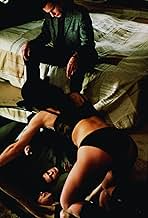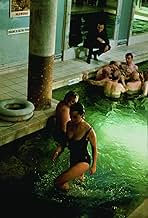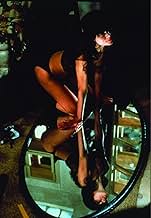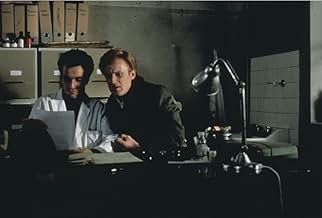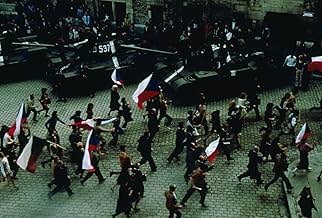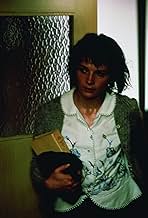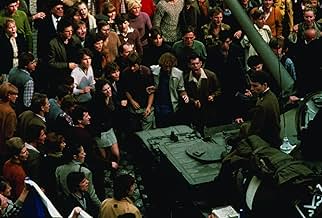A doctor in 1968 Prague struggles with monogamy to his wife's frustration, and then the Soviet invasion further disrupts their lives.A doctor in 1968 Prague struggles with monogamy to his wife's frustration, and then the Soviet invasion further disrupts their lives.A doctor in 1968 Prague struggles with monogamy to his wife's frustration, and then the Soviet invasion further disrupts their lives.
- Director
- Writers
- Stars
- Nominated for 2 Oscars
- 7 wins & 14 nominations total
Pavel Landovský
- Pavel
- (as Pavel Landovsky)
Stellan Skarsgård
- The Engineer
- (as Stellan Skarsgard)
Tomasz Borkowy
- Jiri
- (as Tomek Bork)
Pavel Slabý
- Pavel's Nephew
- (as Pavel Slaby)
László Szabó
- Russian Interrogator
- (as Laszlo Szabo)
- Director
- Writers
- All cast & crew
- Production, box office & more at IMDbPro
Featured reviews
for the courage to adapt the Kundera novel. and for science to not be only an adaptation. for superb acting and for care to details - the black umbrellas is only an example. for delicate poetry of images and for inspired use of politic frame for reflect the nuances of lead characters. and for the message who, for a viewer from East Europe , has a fundamental sound. because is more than a story about choices, forms of love, fragility and need of the other, roots of freedom and pure joy in a dark universe. it is a perfect reflection to remember the web of past as embroidery of life crumbs. and admire the admirable manner of actors to give life to the characters shadows and lights.
Using the Prague Spring of 1968 as a backdrop, The Unbearable Lightness of Being weaves a story of three very real artists and their journey through love, sex and revolution. The film begins by introducing us to Tomas (Daniel Day-Lewis) a very charming womanizer and very intelligent, political doctor. Through all of his one night stands and emotionless sexual encounters, he only has one real lover; Sabina (Lena Olin) is a seductive, carefree artist. When Tomas gets a call to perform an operation in a spa town, he meets the woman of his dreams; Tereza (Juliette Binoche) the shy waitress who dreams of leaving her dull, unchallenging life and heading to a place with intellectuals. When Tomas heads back to Prague, she shows up at his door and they quickly move in together.
This move changes his life completely. He no longer has numerous flings and one night stands, but instead only makes time for Tereza at home and Sabina on the side. When Tomas begs Sabina to provide Tereza with a job, the three embark on a journey of sexual tension, intellectual discussion and artistic wonder. However this love triangle is cut short as Soviet tanks come roaring through Czechoslovakia endangering the freedom of all three characters, who then decide to flee to Switzerland. By this time Tomas and Tereza have been long married, and Sabina meets a new man in the form of Franz (Derek de Lint) a married man who eventually leaves his wife and family for her. The danger of commitment drives Sabina away and she moves to the United States, disappearing for the entire third act of the film.
It's this act that is the most interesting, as it truly examines Tomas and Tereza's tumultuous relationship. Tereza realizes that she is too dependant on him, while he could leave her at any time so she moves back to the now Soviet-controlled Prague and Tomas' love for her drives him to return there. Of course Tomas' political values, including an article he wrote criticizing the Soviet Union and 'implying' that they should all pluck their eyes out doesn't shine too well with the Soviets and they ask him to sign a letter to repudiate his article. Tomas is too proud and declines this offer, which leads to him losing his license and he has to settle to becoming a lowly window washer. But he can't hide his womanizing desires, and his infidelity drives Tereza to the same crime. Eventually her shame and the potential of her awkward lover being a Soviet who will blackmail the couple leads to the two of them moving to a rural village and living their life their together.
The most beautiful and romantic elements of the film are portrayed once they move to the village. Without the temptation of infidelity and the power of political intrigue, their life becomes euphoric and simple. Tomas works in the field all day, while Tereza cooks and cleans and they are never too far away from one another. During a trip to a relatively local bar, Tomas is presented with the opportunity of an affair but quickly brings his gaze back to Tereza showing that he is finally complete with her. This blissful relationship provides overwhelming satisfaction and closure to the chaotic life they had led up to this point.
Highlighting this impeccable picture are three sensational performances, a masterfully adapted screenplay full of beautiful and intriguing dialogue and quite possible the finest cinematography of the '80s. Day-Lewis perfectly encompasses the charm of Tomas with a subtle charisma that keeps my eyes glued to him every time he appears on screen. The young Juliette Binoche is adorable, shy and emotionally powerful but also plays it off very subtly. Lena Olin is overwhelmingly seductive and crafts a sense of freedom unlike any I've ever seen. These characters are all very human which means they have their fair share of flaws and the performances capture every essence of them so perfectly.
This move changes his life completely. He no longer has numerous flings and one night stands, but instead only makes time for Tereza at home and Sabina on the side. When Tomas begs Sabina to provide Tereza with a job, the three embark on a journey of sexual tension, intellectual discussion and artistic wonder. However this love triangle is cut short as Soviet tanks come roaring through Czechoslovakia endangering the freedom of all three characters, who then decide to flee to Switzerland. By this time Tomas and Tereza have been long married, and Sabina meets a new man in the form of Franz (Derek de Lint) a married man who eventually leaves his wife and family for her. The danger of commitment drives Sabina away and she moves to the United States, disappearing for the entire third act of the film.
It's this act that is the most interesting, as it truly examines Tomas and Tereza's tumultuous relationship. Tereza realizes that she is too dependant on him, while he could leave her at any time so she moves back to the now Soviet-controlled Prague and Tomas' love for her drives him to return there. Of course Tomas' political values, including an article he wrote criticizing the Soviet Union and 'implying' that they should all pluck their eyes out doesn't shine too well with the Soviets and they ask him to sign a letter to repudiate his article. Tomas is too proud and declines this offer, which leads to him losing his license and he has to settle to becoming a lowly window washer. But he can't hide his womanizing desires, and his infidelity drives Tereza to the same crime. Eventually her shame and the potential of her awkward lover being a Soviet who will blackmail the couple leads to the two of them moving to a rural village and living their life their together.
The most beautiful and romantic elements of the film are portrayed once they move to the village. Without the temptation of infidelity and the power of political intrigue, their life becomes euphoric and simple. Tomas works in the field all day, while Tereza cooks and cleans and they are never too far away from one another. During a trip to a relatively local bar, Tomas is presented with the opportunity of an affair but quickly brings his gaze back to Tereza showing that he is finally complete with her. This blissful relationship provides overwhelming satisfaction and closure to the chaotic life they had led up to this point.
Highlighting this impeccable picture are three sensational performances, a masterfully adapted screenplay full of beautiful and intriguing dialogue and quite possible the finest cinematography of the '80s. Day-Lewis perfectly encompasses the charm of Tomas with a subtle charisma that keeps my eyes glued to him every time he appears on screen. The young Juliette Binoche is adorable, shy and emotionally powerful but also plays it off very subtly. Lena Olin is overwhelmingly seductive and crafts a sense of freedom unlike any I've ever seen. These characters are all very human which means they have their fair share of flaws and the performances capture every essence of them so perfectly.
I would have to disagree with the previous reviewer. First of all, the movie should have a "euro" feel to it because it's about Europeans, in Europe, and their European mentality. No car chases here, hot shot. That being said, I only have great praise for this film. It's a tremendous attempt to put to screen the subtle understanding Milan Kundera has of the human condition, and it surprisingly succeeds. For those more interested, I recommend you pick up some of his novels (start with a short story if you are pressed for time) and you, too, will realize why he is one of the best storytellers alive today.
I've not read the book this is based on, so have no way to comment on how this movie translates it. But the film itself has stayed in my mind like few others. Yes, it's very long, but the characters are so memorable that the length didn't bother me at all - I loved the time spent in their company. In particular, Juliette Binoche and Lena Olin are each astonishing in their own way. Olin is ferociously sensual and mesmerizing, while Binoche is superlatively sympathetic and sensitive. Two of the best female performances I can remember. By the end of the film I was totally wrapped up in these people's lives. This film is deeply erotic but in an intelligent and adult way that puts most other film's treatment of sex to shame. I thought it was beautifully handled by all concerned, and if I ever want to cry, I only need watch the scenes with the dog and the final scenes, both pulled off superbly.
The best thing about the novel was that the events were more meaningful because along with each event came a piece of the author's philosophy which made not only the plot seem whole but the author's main philosophical argument materialize more and more as we read on.
The movie was only a documentation of the plot and because it was a movie I guess it could only "lightly" touch upon the author's philosophy. Maybe a narrator in the background could have filled us in? I watched the movie not because I enjoyed the plot but because I enjoyed reading the author's ideas about life. They weren't as evident in the movie, but I gave a 6 because the acting and cinematography were good.
The movie was only a documentation of the plot and because it was a movie I guess it could only "lightly" touch upon the author's philosophy. Maybe a narrator in the background could have filled us in? I watched the movie not because I enjoyed the plot but because I enjoyed reading the author's ideas about life. They weren't as evident in the movie, but I gave a 6 because the acting and cinematography were good.
Discover the nominees, explore red carpet fashion, and cast your ballot!
Did you know
- TriviaThe first cut shown to the studio was under two hours in length and the story was confusing. Philip Kaufman was asked to add in scenes he cut. The next day they were shown the theatrically released version. It's believed Kaufman showed them a shorter and confusing version in order to get his almost three-hour final cut approved with no questions of cutting it.
- GoofsMephisto the Pig, consistently referred to as "he", is a sow, as can be seen frequently, but particularly when the group enters the inn for dancing.
- How long is The Unbearable Lightness of Being?Powered by Alexa
Details
- Release date
- Country of origin
- Official sites
- Languages
- Also known as
- La insoportable levedad del ser
- Filming locations
- Prague, Czech Republic(archive footage)
- Production company
- See more company credits at IMDbPro
Box office
- Budget
- $17,000,000 (estimated)
- Gross US & Canada
- $10,006,806
- Opening weekend US & Canada
- $202,189
- Feb 7, 1988
- Gross worldwide
- $10,006,806
- Runtime
- 2h 51m(171 min)
- Color
- Sound mix
- Aspect ratio
- 1.85 : 1
Contribute to this page
Suggest an edit or add missing content


